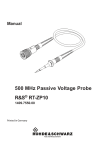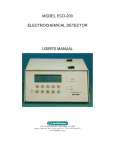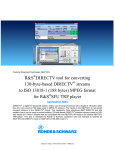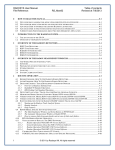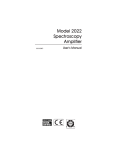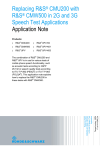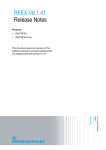Download R&S RT-ZH11 Manual
Transcript
Manual 400 MHz Passive High-Voltage Probe R&S® RT-ZH11 1409.7737.02 Printed in Germany Test and Measurment Manufacturer R&S RT-ZH11 ROHDE & SCHWARZ For comprehensive information about Rohde and Schwarz, please visit our homepage on the R&S Internet (http://www.rohde-schwarz.com). For queries regarding technical aspects of our products, please contact our support at http://www.customersupport.rohde-schwarz.com. For international services, please contact our service partners at http://www.service.rohde-schwarz.com. For additional questions, please contact our headquarters in Munich. ROHDE & SCHWARZ GmbH & Co. KG Mühldorfstraße 15 D-81671 München Phone: +9 (89) 41 29 - 0 Fax: +49 (89) 41 29 - 12 164 2 Declaration of Conformity R&S RT-ZH11 (EC conformity marking) The manufacturer declares the conformity of this product with the actual required safety standards in accordance with the Low Voltage Directive (LVD) 2006/95/EC: CEI/IEC 61010-031:2008 Safety requirements for electrical equipment for measurement, control and laboratory use - Part 031: Safety requirements for hand-held probe assemblies for electrical measurement and test WEEE/ RoHS Directives (EC conformity marking) This electronic product is classified within the WEEE/ RoHS* category list as monitoring and control equipment (category 9). Category 9 products are exempted from the restrictions under the scope of the RoHS directive. Your help and efforts are required to protect and keep clean our environment. Therefore return this electronic product at the end of its life either to the manufacturer or take care of separate WEEE collection and professional WEEE treatment yourself. Do not dispose as unsorted municipal waste! * EC Directives: WEEE Directive 2002/96/EC - RoHS Directive 2002/95/EC - Waste Electrical and Electronic Equipment Restriction of the use of certain Hazardous Substances in Electrical and Electronic Equipment 3 IEC Measurement Categories R&S RT-ZH11 Definitions and Examples (Clause 6.5.2) 4 Measurement Category I Definition: Measurement category I is for measurements performed on circuits not directly connected to a mains supply. Examples: Measurements in circuits not derived from a mains supply and specially protected ( internal ) circuits derived from a mains supply. In the latter case, transient stresses are variable; for that reason it is required that the transient withstand capability of the equipment is made known to the user. Measurement Category II Definition: CAT II Measurement category II is for measurements performed on circuits directly connected to the low voltage installation. Examples: Household appliances, portable tools and similar equipment. Measurement Category III Definition: CAT III Measurement category III is for measurements performed in the building installation. Examples: Measurements on distribution boards, circuit breakers, wiring including cables, bus-bars, junction boxes, switches, socket-outlets in the fixed installation and equipment for industrial use like for example stationary motors with permanent connection to the fixed installation. Measurement Category IV Definition: CAT IV Measurement category IV is for measurements performed at the source of the low-voltage installation. Examples: Electricity meters and measurements on primary over current protection devices and and ripple control units. IEC Pollution Degrees R&S RT-ZH11 Definitions (Clause 3.5.6 ) Pollution Degree 1 No POLLUTION or only dry, non conductive POLLUTION. NOTE: The POLLUTION has no influence. Pollution Degree 2 Only- non conductive POLLUTION. Occasionally, however, a temporary conductivity caused by condensation must be accepted. Pollution Degree 3 Conductive POLLUTION occurs or dry, non-conductive POLLUTION occurs which becomes conductive due to condensation which is to be expected. IEC Safety Symbols The following symbols may appear on the product or in this instruction manual: Caution, risk of danger. Refer to manual. Caution, risk of electric shock. Earth (ground) TERMINAL. 5 Safety Information R&S RT-ZH11 To avoid personal injury and to prevent fire or damage to this product or products connected to it, review and comply with the following safety precautions. Be aware that if you use this probe assembly in a manner not specified the protection this product provides may be impaired. Only qualified personnel should use this probe assembly. Use only grounded instruments. Do not connect the probe ground lead to a potential other than earth ground. Always make sure the probe and the measurement instrument are grounded properly. Connect and disconnect properly. Connect the probe output to the measurement instrument and connect the ground lead to earth ground before connecting the probe to the circuit under test. Disconnect the probe input and the probe ground lead from the circuit under test before disconnecting the probe from the measurement instrument. Observe probe and probe accessory ratings. Do not apply any electrical potential to the probe input which exceeds the maximum ratings of the probe or the accessories connected to it. In a combination always the lower rating / measurement category applies to both probe and accessories connected to it. Make sure to comply with the voltage versus frequency derating curve on page 8. Keep away from live circuits. Avoid open circuitry. Do not touch connections or components when power is present. Do not operate with suspected failures. Refer to qualified service personnel. Indoor use only. Do not operate in wet/damp environment. Keep product surfaces dry and clean. Do not operate the product in an explosive atmosphere. 6 Specifications R&S RT-ZH11 Specifications that are not defined to be warranted are typical and are published as general information to the user. The instrument must have warmed-up for at least 20 minutes and the environmental conditions must not exceed the probe`s specified limits. Electrical Specifications 1000:1 ± 2 % at DC (warranted) 0.0005 %/V 400 MHz (-3 dB) 900 ps (10 % - 90 %) 50 MΩ ± 1 % (warranted) 7.5 pF Maximum Rated Input Voltage (2) Measurement category I: Measurement category II: 1000 V root mean square 4000 V transient overvoltage 1000 V root mean square CAT II Compensation Range Input Coupling of the Measuring Instrument 5 pF - 20 pF 1 MΩ AC / DC Pollution Degree (2) 2 Voltage Derating Note that the max. input voltage rating of the probe decreases as the frequency of the applied signal increases. Amplitude AC root mean square [V] Attenuation Ratio (1) Voltage Coefficient System Bandwidth Probe Risetime Input Resistance (System) Input Capacitance (System) 1200 Typical voltage derating RT-ZH11 Measurement Category I 1000 800 600 400 200 0 100K 1M 10M 100M 1G Frequency [Hz] (1) Connected to appropriate R&S oscilloscope. See R&S oscilloscope operating manual for further details. (2) As defined in IEC 61010-031. Also see definitions explained on page 4 and 5. 7 Specifications R&S RT-ZH11 Maximum Pulse Ratings For pulse measurments make sure to comply with the ratings as shown on this page. Root mean square vs. Peak Pulse Voltage RT-ZH11 Measurement Category I Peak Pulse Voltage [V] 8000 7000 6000 5000 4000 3000 2000 1000 0 0 200 400 600 800 1000 AC root mean square voltage or DC [V] Maximum Peak Pulse Voltage [V] Maximum Pulse Derating RT-ZH11 Measurement Category I Duty Cycle 6000 10% 5500 5000 4500 4000 25% 3500 3000 2500 2000 50% 1500 1000 10* 100 1000 Pulse Duration [ms] 8 * Values at 10 ms also apply to all Pulse Durations smaller than 10 ms. Specifications R&S RT-ZH11 Input Impedance Typical input impedance RT-ZH11 10M Note that the input impedance of the probe decreases as the frequency of the applied signal increases. 1M |Z| [Ohm] 100M 100K 10K 1K 100 10 10 Mechanical Characteristics Weight (probe) Cable Length Probe Tip Diameter 100 1K 10K 100K 1M 10M 100M 1G Frequency [Hz] 67 g 2m 5 mm Environmental Specifications Altitude operating non-operating Temperature Range operating non-operating Maximum Relative Humidity operating up to 2000 m up to 15000 m 0° C to +50° C -40° C to +71° C 80 % relative humidity for temperatures up to +31° C, decreasing linearly to 40 % at +50° C 9 Adjustment Procedures R&S RT-ZH11 The probe can be adjusted for low frequency (LF) compensation and for high frequency (HF) compensation and DC dividing ratio. LF Compensation LF needs to be adjusted when the probe is connected to the oscilloscope input for the first time. LF compensation matches the probes cable capacitance to the oscilloscope input capacitance. This matching assures good amplitude accuracy from DC to upper bandwidth limit frequencies. A poorly compensated probe clearly influences the overall system performance (probe + scope) and introduces measurement errors resulting in inaccurate readings and distorted waveforms. We recommend to use a square wave or rectangular wave generator with an amplitude of 50 Vpp minimum. When using a generator with smaller amplitude it may be useful to choose "RF Reject" in the trigger settings. Adjust the LF compensation trimmer to optimum square wave response. For clarification see below figures. undercompensated LF Compensation 10 optimum overcompensated Adjustment Procedures R&S RT-ZH11 HF Compensation It is typically not necessary to adjust HF compensation unless the probe is being used with an oscilloscope having large differences in input characteristics to the oscilloscope that was used for factory adjustment. We recommend to use the following equiment for proper HF compensation: Rectangular wave generator with a risetime faster than 700 ps, with an amplitude of 50 Vpp minimum, 50 Ohm feed-through and probe BNC adapter. HF adjustment is performed by connecting the probe to the rectangular wave generator. Adjust trimmers for optimum square wave response. DC Adjustment optimum In order to provide highest accuracy over the voltage range this probe´s DC dividing ratio is factory adjusted at 500 V using a measuring device with a precision input impedance of 1MΩ ± 0.01 %. LF Compensation DC HF Compensation 11 Probe Accessory ju Ad stm ent To R&S RT-ZH11 ) et s (s ing g R ors din col Co 3x4 ol Solid Tip 0.8 mm Spring Tip 0.8 mm Ground Lead 22 cm BNC Adapter 5.0-L Insulating Cap 5.0-L black Ground Lead 22 cm to 4 mm banana plug Sprung Hook 5.0-L red Protection Cap 5.0-L black Flexible Adapter 5.0-L to 4 mm safety banana plug Safety Alligator Clip red 12 Safety Alligator Clip black Scope of Delivery R&S RT-ZH11 The following items are included in the scope of delivery. Please check the delivery for completeness. RT-ZH11 400 MHz passive high-voltage probe (Order No. 1409.7737.02) Item Qty Probe RT-ZH11 1 Operating Manual 1 Adjustment Tool 1 BNC Adapter 5.0-L 1 Insulating Cap 5.0-L (black) 1 Protection Cap 5.0-L (black) 1(1) Coding Rings (set) 3x4 Colors 1 Ground Lead 22 cm 2 Ground Lead 22 cm to 4 mm banana plug 1 Safety Alligator Clip (black) 1 Safety Alligator Clip (red) 1 Solid Tip 0.8 mm 5 Spring Tip 0.8 mm 5(2) Sprung Hook 5.0-L (red) 2 Flexible Adapter 5.0-L to 4 mm safety banana plug 1 (1) plugged on probe (2) one is installed in probe Use ground lead only for connections to earth ground. The BNC Adapter is rated: 100 V root mean square CAT II, Pollution Degree 1 The accessories provided with the probe have been safety tested. Do not use any other accessories than those “originally” provided. 13 Handling R&S RT-ZH11 Handle with care especially when fitted with the extra thin and sharp spring contact tip to avoid any injury. Note that the probe cable is a sensitive part of the probe. Do not damage through excessive bending or pulling. Avoid mechanical shock to this product in general to guarantee accurate performance and protection. Maintenance Cleaning To clean the exterior of the probe use a soft cloth moistened with either distillated water or isopropyl alcohol. Before use allow the probe to dry completely. Changing the Probe Tip To change the probe tip use pliers to grip and pull it carefully straight out of its contact socket, along the axis of the probe. Do not grip the white plastic insulator or the housing with pliers, because the tip could be squeezed and cannot be removed and respectively the probe could be damaged. If the probe tip is removed, the new tip can be inserted with pliers into the contact socket, along the axis of the probe. In order to insert the probe tip completely into the housing, press the probe tip against a hard surface carefully. Use pliers to grip and pull the probe tip carefully out of its contact socket. 14 Do not grip the white plastic insulator or the probe housing with pliers. R&S RT-ZH11 This page is reserved. 15 Copyright®2011 ROHDE & SCHWARZ All rights reserved. Information in this publication supersedes that in all previously published material. Specifications are subject to change without notice. M-RT-ZH11 Revision A - Juli 2011
















